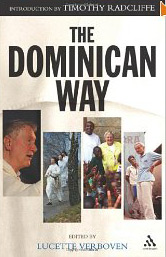Book Review
The Dominican Way
 |
| The Dominican Way, Ed. Lucette Verboven, with Introduction by Timothy Radcliffe, OP. London and New York: Continuum, December 2011. Available through amazon.com |
By Ruth Caspar, OP
“We are a big family, used to welcoming different people. Some are very traditional, some are a bit crazy!” So responds Jean-Jacques Pérennès, OP, of the Dominican Institute of Oriental Studies in Cairo, in an interview with Lucette Verboven. This interview, along with those of 16 other Dominicans, can be found in Verboven’s anthology: “The Dominican Way.” Among these 17 family members are friars, monastic women, sisters, and laity; with ministries in Europe (UK, Ireland, Italy, Norway, Belgium, France, Belarus); Africa (Benin, Nigeria), Middle East (Iraq, Egypt), Asia (Japan), North and South America (USA, Brazil).
The two people most responsible for this remarkable collection of interviews are Verboven, a Flemish writer and film producer, and Timothy Radcliffe, Master of the Order of Preachers from 1992 to 2001. It was largely because of Verboven’s initial interview of Fr. Timothy in 1997 (there are two others in the book) that the author was drawn to examine “the Dominican Way” over a period of years, and in the process encounter these nine men and eight women whose lives and ministries reveal the present vitality of an Order celebrating 800 years of history.
Every significant aspect of the charism of the Order can be found in this collection: two young nuns (names withheld for their protection) speak eloquently for the monastic and contemplative life as they describe a hidden novitiate and period of formation in Eastern Europe while they wait to establish a foundation in Belarus. Breda Carroll, prioress of a monastic community in Ireland, speaks of her love of liturgy, adoration and community life as she affirms the strong bond of relationship between friars and nuns from the beginning of the Order. And Japanese friar Vincent Oshida weds the Christian and Buddhist traditions in the community he founded in Japan, rooted in poverty and meditation.
Korean artist Kim En Joong and Scottish composer James MacMillan find inspiration for their painting and music in the vibrant prayer and liturgy of the Dominican tradition. MacMillan, with his wife a member of the Dominican laity in Glasgow, was recently commissioned to compose the Mass celebrated by Pope Benedict XVI for the beatification of Cardinal Newman.
Witnessing to the central role of study in the charism of the Order of Preachers are the interviews with Katarina Pajchel, a Dominican sister and physicist, working in particle physics at CERN, the prestigious European organization for nuclear research in Switzerland; and Helen Alford, dean of the Faculty of Social Sciences at the Order’s Pontifical University, the Angelicum, in Rome—the first woman to hold that position. It was on the foundation of his studies in the United States that Nigerian friar Godfrey Nzamujo could return to Africa where he utilized his expertise in engineering to establish an ecological agri-business center in Benin.
Perhaps most eloquently represented are the various ministries of justice, dialogue and peace-building reflected in the interviews with those whose lives have truly been at risk as they preach the peace of Christ in situations of conflict: Prioresses Maria Hanna (Iraq) and Faustina Jimoh (Nigeria) whose communities have endured constant danger and political oppression; Jean-Jacques Pérennès, Vicar Provincial of Dominicans in Arab countries, and his colleague Emilio Platti, whose passion is Christian-Muslim dialogue; and Henri Burin des Roziers, a Dominican lawyer who worked with Sister Dorothy Stang in Brazil defending the rights of the landless peasants in the Amazon forests, and lives with a bounty on his head.
Three of those interviewed for this collection have perhaps contributed most to the cohesiveness of the several branches of the Dominican Family: the friars, the nuns, the congregations of active sisters, and the Dominican laity. They are Fr. Timothy, Sr. Margaret Ormond, whom he delegated to initiate the first world-wide office for Dominican Sisters—Dominican Sisters International—in 1998; and Fr. Brian Pierce, former missionary to Latin America, who is the Order’s Promoter for contemplative, cloistered nuns throughout the world.
In the Prologue of the earliest text of the Constitutions of the Order of Preachers (1228) we find this statement: “…it is known that our Order was founded, from the beginning, especially for preaching and the salvation of souls. Our study ought to tend principally, ardently, and with the highest endeavor to the end that we might be useful to the souls of our neighbors.” Reading this collection of first-hand accounts of contemporary preaching, there is no doubt that the Founder’s dream, a form of simple but profound pragmatism, is fulfilled in the lives of these members of the Dominican Family.
Ruth Caspar, OP, is a Dominican Sister of Peace.




